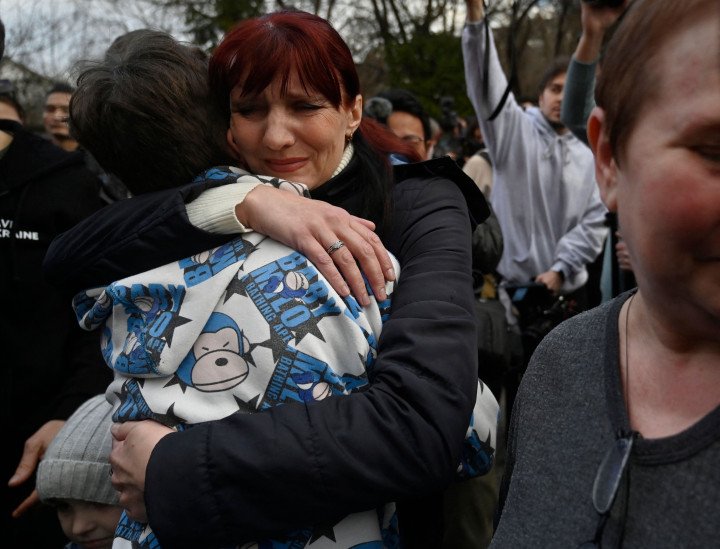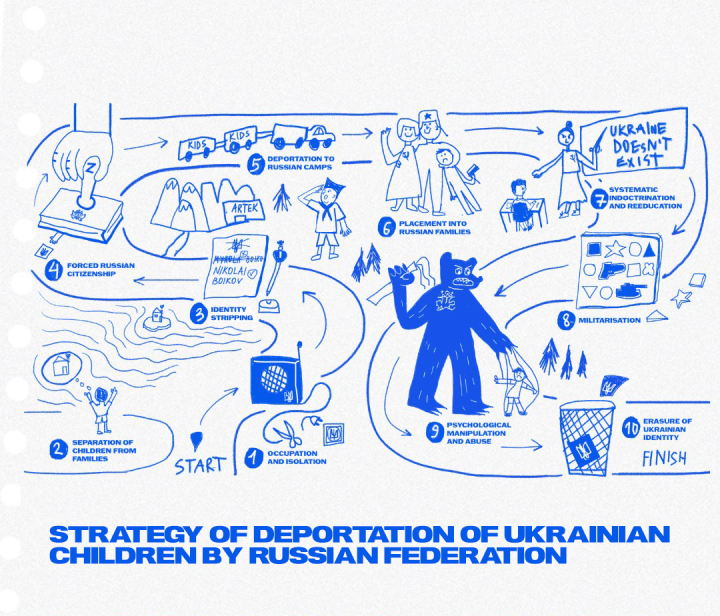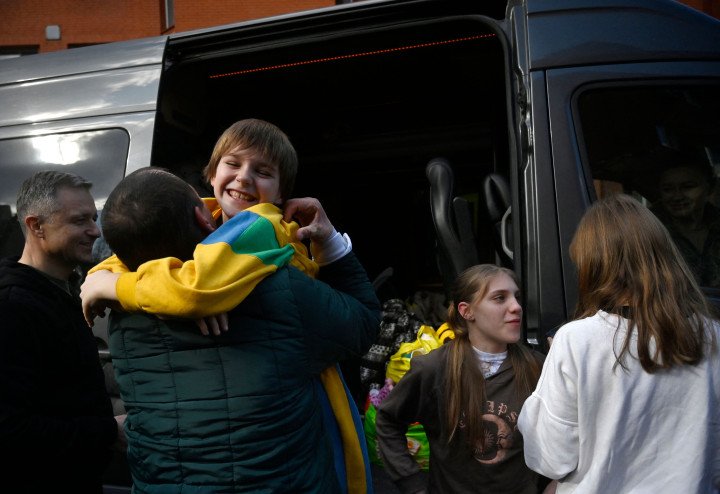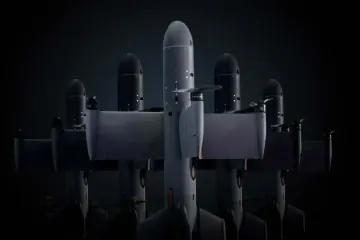- Category
- Opinion
It’s Time for the World to Act to Bring Ukraine’s Stolen Kids Back Home from Russia
-c3ee79793bb47db9e8ccba9263b4bae5.jpeg)
When Russian soldiers stormed Vladyslav’s dorm, Mariupol was already under daily airstrikes and bombings. Without a moment’s notice, he and others were forcibly taken by the Russians for “filtration” into the depths of occupied territory. Interrogations followed—beatings and humiliation.
Afterward, Vladyslav was sent to a holding facility in Russia, then transferred to a Russian orphanage, and later placed with a Russian foster family. Ukraine received no word of his fate. Despite numerous obstacles created by Russian authorities, Vladyslav eventually found his way home on his own. Today, he is in Kyiv, a victim of the crime of deportation.
When Russia occupied Kherson, Marharyta was just 10 months old. She and her brother were in a children’s home in Kherson. Russian soldiers arrived, separated them, and took the little girl to a Russian family without informing any of her relatives. A Russian lawmaker changed her name and birth date, turning Marharyta Prokopenko into Marina Mironova, the daughter of Russian State Duma Deputy Sergey Mironov. Ukraine is still fighting for her return.
As Russian troops withdrew from Kharkiv, they abducted several teenagers from a small town, dressing them in military uniforms and giving them weapons. Among them was Serhiy. He tried to escape multiple times, enduring psychological abuse and torture at the border. On his third attempt, he accidentally managed to return to Ukraine.
Little Yeseniia was born in May 2022 on temporarily occupied territory, with no way to obtain Ukrainian documents, which meant she couldn’t leave or cross the Russian border. After months of tireless efforts by the state and human rights defenders, she is finally back home in Ukraine.
These are just four stories among thousands of deported and forcibly relocated children who have witnessed and fallen victim to war crimes. These are the cases we know, where we can offer help. Yet, the whereabouts of tens of thousands of Ukrainian children in Russia remain unknown.

The Bring Kids Back UA team has turned to an international expert group to assess Russia’s actions regarding the forced relocation of Ukrainian children from occupied and frontline areas. For nearly five months, top international lawyers analyzed Russia’s policies on the relocation of Ukrainian children, culminating in a comprehensive report—the White Paper on Safeguarding Children from Forced Transfers and Deportation.
The authors unanimously classify Russia’s actions as a war crime.
The starting point is that criminals rarely see themselves as such—they always find ways to justify their actions. The arrest warrant issued by the International Criminal Court for Vladimir Putin and Maria Lvova-Belova marks the beginning of a long and tough path to justice. But it’s only the first step. To ensure the safe return of Ukraine’s stolen children and hold Russia accountable, coordinated international efforts must continue, and pressure must increase.
The White Paper shatters the Kremlin’s myth of “saving” children and sets the record straight. We are fully aware that we are up against one of the world’s most powerful propaganda machines. The Russian propaganda machine distorts reality, presenting one of the most heinous crimes as an act of mercy. But truth is always the strongest weapon in the information war.

Pressure on Russia must intensify
The White Paper is part of Ukraine’s strategy to bring all deported children home, which is a key element of Point 4 of Ukraine’s Peace Formula. It’s not just a collection of facts; it’s a tool for international legal pressure on Russia. The report demonstrates the systematic and deliberate nature of Russia’s deportation and forced relocation of children, a violation of international law that demands action.
The White Paper contains clear demands of the Russian Federation, including the full disclosure of information about children located in Russia and their unconditional return to Ukraine. It’s not enough to demand Russia comply with international law and protect children’s rights. We must create mechanisms to enforce these rules. One of the key demands is granting humanitarian access to international missions to visit the locations where children are held, including temporarily occupied territories, which is critical for identifying these children and ensuring their safe return.
Global support for the return of Ukrainian children
The White Paper is not just an analytical document but also an advocacy tool—a roadmap for all members of the International Coalition for the Return of Ukrainian Children, countries where children’s rights are taken seriously. It builds on the Communiqué supported by over 90 countries at the First Peace Summit, where nations emphasized the importance of collective efforts to bring Ukrainian children home. The White Paper provides consistent arguments for increasing international pressure on Russia and developing new mechanisms to protect children’s rights globally.
The findings of the White Paper served as the foundation for the Joint Statement by the co-chairs of the International Coalition for the Return of Ukrainian Children, adopted on October 1, 2024. In this document, Ukraine and Canada outlined the key principles guiding the return of all illegally deported and forcibly relocated Ukrainian children:
Transparency: Russia must provide full access to information about all Ukrainian children in its territory, including their whereabouts, legal status, and any changes in personal data.
Access: The Russian Federation must grant unrestricted access to international missions, including to children in social, educational, and medical institutions.
Support for Ukraine’s humanitarian efforts: Continued humanitarian support for Ukraine’s efforts to rescue children from deportation and forced relocation, and the evacuation of those at risk.
Long-term support and reintegration: Commitment to reintegration programs that take into account the gender, age, and specific needs of affected children to ensure their best interests.
Access to justice: After their return, children must receive legal assistance to achieve justice and long-term reparations.
Together with experts, we urge the international community to actively join efforts to bring Ukrainian children home. The White Paper is not just a document; it’s a call to action. If the global community does not take proactive steps today, thousands of Ukrainian children may lose their Ukrainian identity forever, and Russia will continue raising a new generation that harbors hatred toward the democratic world. We all know how dictators learn from each other. Stopping this crime and punishing the perpetrator is essential to prevent similar atrocities in the future, anywhere in the world. We must show that we are ready to fight for a safe future for children now.

Be a voice for the children
Every voice in support of kidnapped children is another step toward their return. The presidential initiative Bring Kids Back UA is becoming a global movement, one that anyone can join. You can contribute to the fight for justice by spreading the truth about deportation and forced relocation, helping with recovery efforts, and supporting families.
If you represent a government, consider joining the International Coalition for the Return of Ukrainian Children and working for the interests of children alongside 40 Coalition members today.
Leading human rights organizations, academics, international lawyers, and independent experts can join the Bring Kids Back UA Task Force to work on analytical documents and develop international mechanisms to protect children from deportation and forced relocation.
Public figures and celebrities can help raise awareness about the deported children, calling for their return and justice. Filmmakers and producers can create documentary and narrative projects using the contacts and expertise of Bring Kids Back UA.
The Bring Kids Back UA team is open to working with media and independent journalists to ensure that the voices of these children are heard.
Join us.
-3bcae00d8329e73d76a87c52b1573c89.png)
-2c683d1619a06f3b17d6ca7dd11ad5a1.jpg)

-da3d9b88efb4b978fa15568884ef067f.jpg)
-73e9c0fd8873a094288a7552f3ac2ab4.jpg)
-f3bede69822b36ac993a6cd5b65014f9.png)


